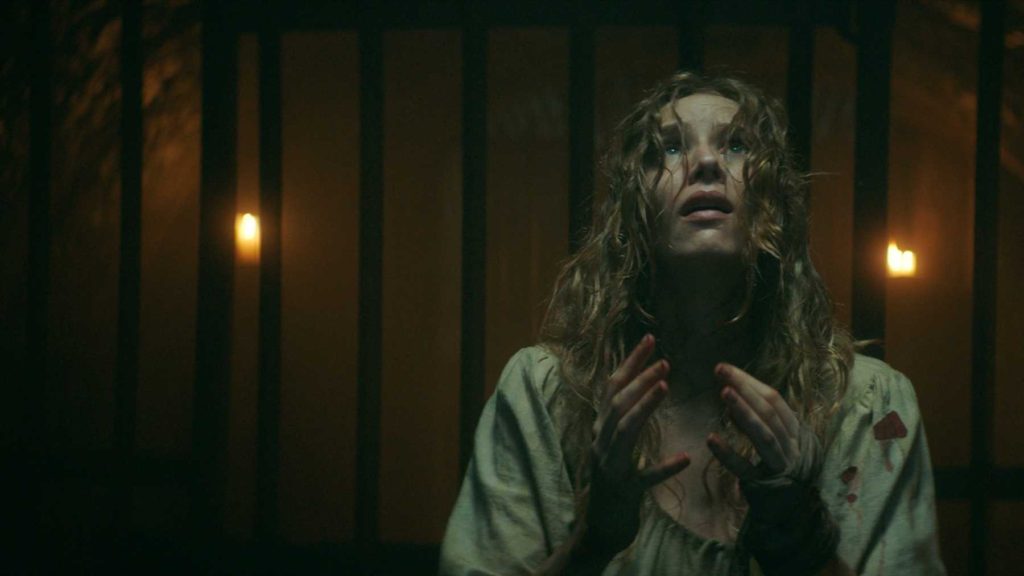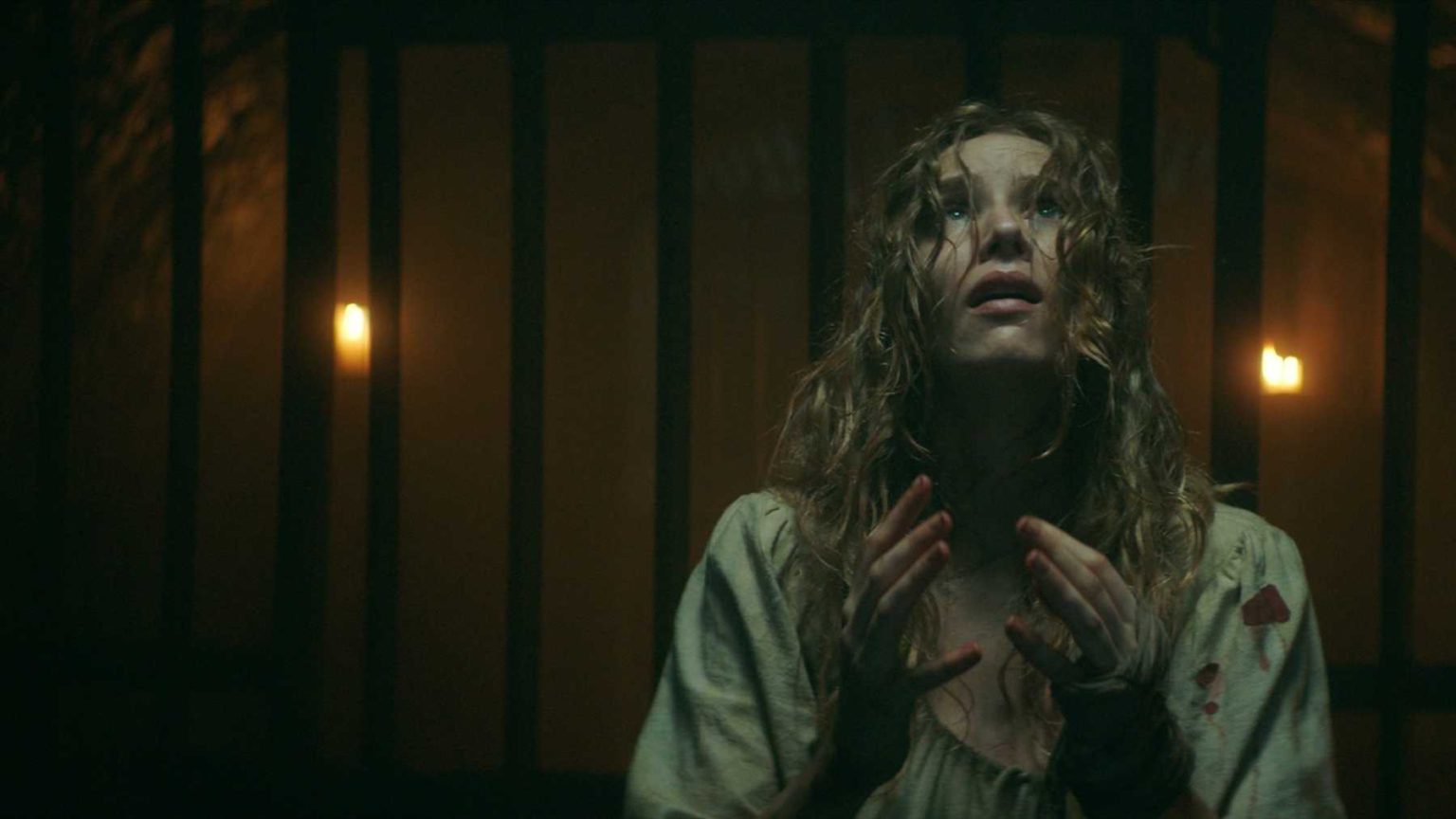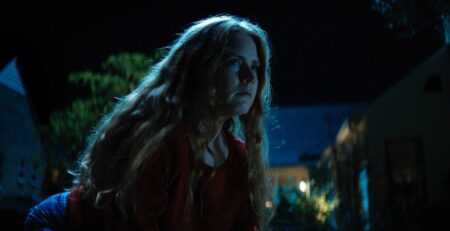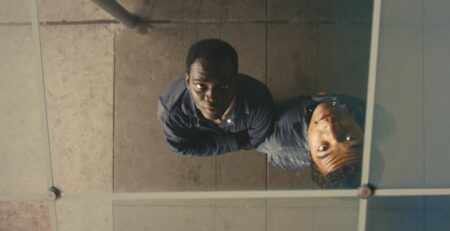
Witches, figures of legend, and the witch trials, an especially dark shadow on our shared human history, are popular source material for a reason. The mystique of witches, women holding ultimate or unholy power, and the shocking truth that hundreds of thousands of women were sacrificed to eras of ignorance and rigid patriarchal control are rich soil to the creative mind. The stories of the women that were murdered in the witch trials are historic tragedies that still gnaw at our minds because we can still connect the hardships of those women with current cultural moments. When done right stories of witches and witch trials can be incredible displays of female defiance and empowerment.
This is why the sins of The Reckoning are so unforgivably offensive.
The Reckoning is directed by Neil Marshall (Dog Soldiers, The Descent) and is the collaborative screenwriting effort of Marshall, Edward Evers-Swindell, and Charlotte Kirk — who also stars in the film. Set in some vague medieval period that includes the Great Plague and castles but also has invented beauty YouTuber contouring techniques, a young woman named Grace (Kirk) must grapple with the untimely death of her husband. She lives in a time gripped by death and paranoia, where women have become the scapegoat for all the world’s ills. When Grace’s landlord makes forceful advances on her, she rejects him and therefore makes herself the target of his vengeance. Grace is accused of witchcraft and subjected to the same tortures that killed her mother. Will her iron resolve stand against the most famous witchfinder of her time?
The Reckoning has a lot of problems that fall under the umbrella of its extremely bizarre tone. Running side by side through the film are two very distinct threads. One is the story of a woman that is tortured and accused of witchcraft for rejecting the advances of her landlord. The other is the bizarre love story of Grace and her late husband. The film begins with Grace burying her husband (with great dramatic flair), but the film constantly calls back to their marriage and relationship. If I was being charitable, I would guess that these moments are supposed to give Grace the strength to go on but The Reckoning isn’t very clear.
The entire narrative structure of The Reckoning is a tad confused and appears to focus more on a shocking visual than a reason to use one. It’s impossible to tell what is a memory, what is a hallucination, and what is a real threat as Grace recalls the loving marriage she had, sees the decayed forms of dead family members, and Lucifer himself shows up repeatedly to torment her. Instead of creating an air of frantic confusion as Grace fights to stay sane — I have to assume this is what they were going for — the chaos sends mixed messages to the viewer. It’s all shock, no value, and delivered in a nauseatingly melodramatic format.
Unfortunately, any hope that The Reckoning had of being an empowering revenge fantasy is utterly obliterated by the male gaze. This film is voyeuristic, exploitative, and uses the specifically sexual horrors of the witch hunt era as an excuse to leer rather than to horrify. This is another area where the two tones of the film are to the detriment of The Reckoning. Audiences spend more time seeing Grace have sex with her husband than they do understanding what memories of his love and support are doing to get her through these troubles. When the Devil appears to Grace, it is not to tempt or threaten but to molest and scandalize. Every male villain of The Reckoning is a mustache-twirling, panting, and sweating caricature to such a degree that I feel like I’m watching the beginning of a bad BDSM adult film every time they appear on the screen.

This softcore take on the witch trials is unforgivable when it tries to wear a mask of female empowerment. The fact of that matter is that female sexuality was vilified. The female anatomy was intentionally misunderstood in the pursuit of placing blame and finding witches. The most scandalous legends of witchcraft include the fornications of the Devil. All of these more titillating elements of the history of witch hunts are low-hanging fruit and easy to exploit. I get it. But it is an insult that the filmmakers try to pretend they are doing anything other than exploiting those elements.
It’s equally true that most victims of the witch hunts were homeless women that were burdens on the community. Or widows that may have inherited property and did not remarry. Women healers with knowledge that threatened the Church were targeted. The story of these 500,000+ women that were sacrificed to man’s ignorance and paranoia is worth exploring. It’s a historical wrong that we may wish right, through the escapism of film. It would have been a better movie than what we got here — a sloppily executed, poorly researched amusement park ride through kink masquerading as horror and history.
The Reckoning will be available in theaters, digitally, and On-Demand on February 5, 2021.
The Reckoning
-
Rating - 3/103/10
TL;DR
Unfortunately, any hope that The Reckoning had of being an empowering revenge fantasy is utterly obliterated by the male gaze.





